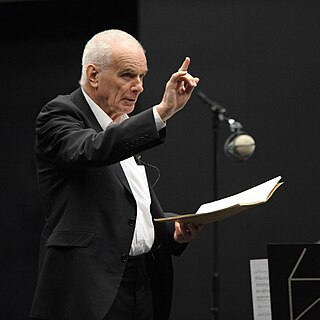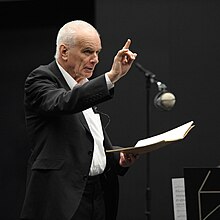A concerto is, from the late Baroque era, mostly understood as an instrumental composition, written for one or more soloists accompanied by an orchestra or other ensemble. The typical three-movement structure, a slow movement preceded and followed by fast movements, became a standard from the early 18th century.
The Strathclyde Concertos are a series of ten orchestral works by the English composer Sir Peter Maxwell Davies.

The Symphony No. 2 by Peter Maxwell Davies was commissioned by the Boston Symphony Orchestra in celebration of its centenary, and was composed in 1980. Seiji Ozawa conducted the world premiere with the BSO on 26 February 1981 at Symphony Hall, Boston. The same forces performed the New York premiere on 4 March that year at Carnegie Hall.

The Symphony No. 3 by Peter Maxwell Davies was composed in 1984 on a commission from the BBC Philharmonic, who gave the world premiere on 19 February 1985, at the Free Trade Hall in Manchester, with Edward Downes conducting.

The Symphony No. 4 by Peter Maxwell Davies was commissioned for the Scottish Chamber Orchestra by Christian Salvesen plc and composed in 1989. It is dedicated to the memory of the violinist John Tunnell, who had been leader of the orchestra, and was premiered at the Royal Albert Hall on a BBC Promenade Concert on 10 September 1989, with the composer conducting the Scottish Chamber Orchestra.

The Symphony No. 5 was composed by Peter Maxwell Davies in 1994 on commission from the Philharmonia Orchestra, who gave the world premiere under the composer's direction at a BBC Promenade concert on 9 August 1994 at the Royal Albert Hall in London.

The Symphony No. 10, Op. 327, is a composition for orchestra, chorus, and baritone soloist, composed by Peter Maxwell Davies in 2013. It was premiered on 2 February 2014 at the Barbican Hall in London, by the London Symphony Orchestra and Chorus, with baritone soloist Markus Butter, conducted by Antonio Pappano.
Symphony No. 2 is a symphony in three connected movements for orchestra by the American composer Christopher Rouse. The piece was commissioned by the Houston Symphony and completed July 15, 1994. The work premiered later that year and is dedicated to then Houston Symphony director Christoph Eschenbach.
The Cello Concerto is a composition for solo cello and orchestra by the Scottish composer James MacMillan. It is the second of three interrelated compositions in MacMillan's Easter triptych Triduum commissioned by the London Symphony Orchestra. The piece was first performed at the Barbican Centre on October 3, 1996 by the cellist Mstislav Rostropovich and the London Symphony Orchestra under the conductor Colin Davis. The work is dedicated to Mstislav Rostropovich.
Worldes Blis is a motet for orchestra by the British composer Peter Maxwell Davies. It was first performed at The Proms on 28 August 1969 by the BBC Symphony Orchestra conducted by the composer.
The Asko Concerto is a concerto for chamber orchestra by the American composer Elliott Carter. The work was commissioned by the Dutch chamber group Asko|Schönberg, for which the piece is titled. It was composed in January 2000 and was first performed in Concertgebouw, Amsterdam on April 26, 2000, by the Asko ensemble under the conductor Oliver Knussen. The piece is dedicated to Asko|Schönberg.
The Symphony No. 1 is a symphony for orchestra by the American composer Elliott Carter. The work was originally completed in Santa Fe, New Mexico on December 18, 1942, though Carter later revised the work in 1954. It was first performed on April 27, 1944, by the Eastman-Rochester Symphony under the direction of Howard Hanson at the fourteenth annual Festival of American Music. The piece is dedicated to Carter's wife.
The Piano Concerto is a composition for solo piano and orchestra by the British composer Peter Maxwell Davies. The work was commissioned by the Royal Philharmonic Orchestra and was completed on 24 September 1997. The piece is dedicated to the pianist Kathryn Stott, who premiered the work with the Royal Philharmonic Orchestra under the composer at the Nottingham Royal Concert Hall on 7 November 1997.
The Cello Concerto No. 1 is a composition for solo cello and orchestra by the Finnish composer Magnus Lindberg. It was first performed in the Cité de la Musique, Paris on May 6, 1999 by the cellist Anssi Karttunen and the Orchestre de Paris under the direction of Esa-Pekka Salonen.
Kraft is a composition for solo ensemble, electronics, and orchestra by the Finnish composer Magnus Lindberg. The work was commissioned by the Helsinki Festival and was first performed on September 4, 1985 by the Toimii ensemble and the Finnish Radio Symphony Orchestra under the direction of Esa-Pekka Salonen. The piece was awarded the International Rostrum of Composers in 1986 and won the Nordic Council Music Prize in 1988.
The Concerto for Piano and Orchestra is the first piano concerto by the Finnish composer Magnus Lindberg. The work was commissioned by the Helsinki Festival on September 4, 1991 and completed in 1994. It is dedicated to the pianist Paul Crossley.
The Piano Concerto No. 1 is a composition for solo piano and orchestra by the American composer Peter Lieberson. The work was commissioned by the Boston Symphony Orchestra for its centennial. Lieberson started composing the piece in 1980 and completed it on March 2, 1983. It was written for the pianist Peter Serkin, who first performed the concerto with the Boston Symphony Orchestra under the direction of Seiji Ozawa on April 21, 1983. The piece is dedicated to Peter Serkin and Seiji Ozawa. It was a finalist for the 1984 Pulitzer Prize for Music.
The World's Ransoming is a concerto for cor anglais and orchestra by the Scottish composer James MacMillan. It was the first of three interrelated compositions in MacMillan's Easter triptych Triduum commissioned by the London Symphony Orchestra. Its world premiere was given by the soloist Christine Pendrill and the London Symphony Orchestra under the direction of Kent Nagano at the Barbican Centre on 11 July 1996.
The Violin Concerto No. 1 is the first violin concerto by the British composer Peter Maxwell Davies. It was commissioned by the Royal Philharmonic Orchestra to commemorate the ensemble's 40th anniversary. The work was completed in 1985 and first performed at the St Magnus Festival by the violinist Isaac Stern and the Royal Philharmonic Orchestra conducted by André Previn on 21 June 1986. The piece is dedicated to Isaac Stern.
Unsuk Chin's Piano Concerto was composed between 1996 and 1997 on a commission from the BBC for the BBC National Orchestra of Wales. The piece was first performed by the pianist Rolf Hind and the BBC National Orchestra of Wales conducted by Mark Wigglesworth at St David's Hall, Cardiff, on 6 June 1997.


